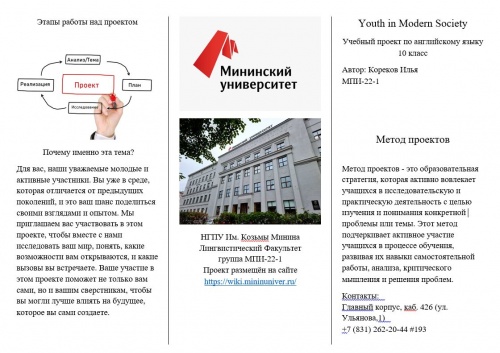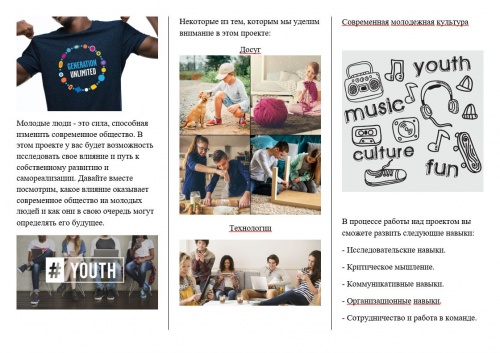Учебный проект Youth in modern society: различия между версиями
(→Проблемные вопросы) |
(→Краткая аннотация проекта) |
||
| (не показано 19 промежуточных версий этого же участника) | |||
| Строка 8: | Строка 8: | ||
== Краткая аннотация проекта == | == Краткая аннотация проекта == | ||
| + | This project aims to research and analyse the leisure preferences of young people in order to identify the most common leisure activities. It also aims to identify the links between society and these activities. | ||
| + | Students will develop a data collection methodology, conduct surveys and interviews, analyse the results and present them in an accessible form. | ||
| + | |||
| + | The project promotes research skills, data analysis, and the ability to present findings clearly and concisely. | ||
| + | |||
| + | The focus is on the interests of young people, providing a better understanding of their leisure preferences in today's society. | ||
| + | |||
| + | Данный проект направлен на исследование и анализ предпочтений молодежи в сфере досуга с целью выявления наиболее распространенных досуговых активностей. А также на выявление связей между обществом и данными активностями. | ||
| + | |||
| + | Учащиеся будут разрабатывать методику сбора данных, проводить опросы и интервью, анализировать полученные результаты и представлять их в доступной форме. | ||
| + | |||
| + | Проект способствует развитию навыков исследования, анализа данных, а также умения четко и лаконично представлять результаты. | ||
| + | |||
| + | Акцент делается на интересах молодежи, обеспечивая лучшее понимание их досуговых предпочтений в современном обществе. | ||
== Вопросы, направляющие проект == | == Вопросы, направляющие проект == | ||
| Строка 37: | Строка 51: | ||
How can communities and schools encourage a healthy balance between leisure time and academic responsibilities for young individuals? | How can communities and schools encourage a healthy balance between leisure time and academic responsibilities for young individuals? | ||
| − | + | Как общины и школы могут поощрять здоровое сочетание досугового времени и учебных обязанностей среди молодых людей? | |
==План проведения проекта== | ==План проведения проекта== | ||
| + | 1. Introduction, Group Formation, Role Distribution, and Work Plan Creation: | ||
| + | |||
| + | At this stage, the students come together to understand the project's objectives, scope, and goals. They divide into groups if necessary and assign roles based on each member's strengths and expertise. | ||
| + | |||
| + | The students collaboratively create a detailed work plan, outlining tasks, deadlines, and responsibilities. | ||
| + | |||
| + | 2. Collection and Processing of Information: | ||
| + | |||
| + | The students begin data collection and research, utilizing various sources such as surveys, interviews, and academic materials. | ||
| + | |||
| + | They gather, record, and process information relevant to the project's focus. | ||
| + | |||
| + | 3. Presentation of the Results of the Work: | ||
| + | |||
| + | This stage involves the synthesis of findings and the creation of a clear and engaging presentation format. | ||
| + | |||
| + | The students prepare visuals, infographics, or other materials to illustrate their findings. | ||
| + | |||
| + | They structure the presentation, ensuring that it effectively communicates the project's objectives, methods, and results to the audience. | ||
| + | |||
| + | 4. Project Defense: | ||
| + | |||
| + | During the project defense, the students presents their findings to an audience, typically including project supervisors or peers. | ||
| + | |||
| + | They provide a comprehensive overview of the project, its objectives, and key findings. | ||
| + | |||
| + | 5. Reflection: | ||
| + | |||
| + | After the project is completed and presented, the students engages in a reflective process. | ||
| + | They evaluate the project's overall success, identifying areas of improvement and learning from the experience. | ||
== Публикация преподавателя == | == Публикация преподавателя == | ||
| + | [[Изображение:Буклет_Кореков1.jpg|500px]] | ||
| + | [[Изображение:Буклет_Кореков2.jpg|500px]] | ||
== Презентация преподавателя для выявления представлений и интересов учащихся == | == Презентация преподавателя для выявления представлений и интересов учащихся == | ||
| + | |||
| + | [https://docs.google.com/presentation/d/1WwOmAwXExhOWHDgI2DZQiwNvuTq1cyOT/edit?usp=drive_link Стартовая презентация] | ||
== Пример продукта проектной деятельности учащихся == | == Пример продукта проектной деятельности учащихся == | ||
| + | [[Результаты исследования обучающихся в проекте Youth in modern society]] | ||
== Материалы по формирующему и итоговому оцениванию == | == Материалы по формирующему и итоговому оцениванию == | ||
| + | Самооценка совместной работы в группе/Self-evaluation of joint work in a group [https://docs.google.com/forms/d/e/1FAIpQLSfTd5Neg82Nhk_Gfu0zMs849oIOZvXZ4HDL8aszl_j0NcItMA/viewform?usp=sf_link Questionnaire] | ||
| + | |||
| + | [https://docs.google.com/document/d/1yHPT8pctzAfOJhPVgv-W5Eg4np8g4obHbcVUFmK6SLY/edit?usp=sharing Evaluation Criteria for Student's Wiki Page/Критерии оценивания вики-статей] | ||
== Материалы по сопровождению и поддержке проектной деятельности == | == Материалы по сопровождению и поддержке проектной деятельности == | ||
| + | *[[Шаблон:Вики-статья студента]] | ||
| + | *[http://ru.wikibooks.org/wiki/%D0%92%D0%B8%D0%BA%D0%B8 Учебник по вики] | ||
| + | *[https://docs.google.com/presentation/d/1HZvOOrvdHuCCXGwuWYukFb__SvGICIeqTv_TMSDuusA/edit#slide=id.p Создание ленты времени в Timegraphics] | ||
| + | *[https://docs.google.com/presentation/d/1pb73LaWhBrZlVjEtyQeXzlpLToe4JPNXVTjkG2NI0yg/edit#slide=id.p Создание ленты времени в Tiki-Toki] | ||
| + | *[https://docs.google.com/presentation/d/16sxdwmaCVS_mWvNolt9vI1TQttNO3D24Bk4mdgeNC0s/edit?usp=sharing Создание ментальной карты в Mindomo] | ||
| + | *[https://docs.google.com/presentation/d/1QaXpSKJqLaNGlPL9LwJcEOu-GLjAIGTHmE7jELFpzBM/edit#slide=id.g35fdd65c2_025 Создание ментальной карты в MindMeister] | ||
| + | *[https://docs.google.com/presentation/d/1E7p1pU-GfaFWWwqFWBbVkBkrZUElpU7IsyVQxscpW1M/edit#slide=id.p Создание ментальной карты в Spiderscribe] | ||
== Полезные ресурсы == | == Полезные ресурсы == | ||
| − | + | [https://youtube.com/ Youtube] | |
| + | |||
| + | [https://ed.ted.com/ TedEd] | ||
| − | + | [https://www.reddit.com/ Reddit] | |
== Другие документы == | == Другие документы == | ||
Текущая версия на 17:36, 2 ноября 2023
Содержание
- 1 Автор проекта
- 2 Предмет, класс
- 3 Краткая аннотация проекта
- 4 Вопросы, направляющие проект
- 5 План проведения проекта
- 6 Публикация преподавателя
- 7 Презентация преподавателя для выявления представлений и интересов учащихся
- 8 Пример продукта проектной деятельности учащихся
- 9 Материалы по формирующему и итоговому оцениванию
- 10 Материалы по сопровождению и поддержке проектной деятельности
- 11 Полезные ресурсы
- 12 Другие документы
Автор проекта
Предмет, класс
Английский язык, 10 класс.
Краткая аннотация проекта
This project aims to research and analyse the leisure preferences of young people in order to identify the most common leisure activities. It also aims to identify the links between society and these activities.
Students will develop a data collection methodology, conduct surveys and interviews, analyse the results and present them in an accessible form.
The project promotes research skills, data analysis, and the ability to present findings clearly and concisely.
The focus is on the interests of young people, providing a better understanding of their leisure preferences in today's society.
Данный проект направлен на исследование и анализ предпочтений молодежи в сфере досуга с целью выявления наиболее распространенных досуговых активностей. А также на выявление связей между обществом и данными активностями.
Учащиеся будут разрабатывать методику сбора данных, проводить опросы и интервью, анализировать полученные результаты и представлять их в доступной форме.
Проект способствует развитию навыков исследования, анализа данных, а также умения четко и лаконично представлять результаты.
Акцент делается на интересах молодежи, обеспечивая лучшее понимание их досуговых предпочтений в современном обществе.
Вопросы, направляющие проект
Основополагающий вопрос
How do leisure activities and interests of youth contribute to their overall well-being and development in modern society?
Как досуг и интересы молодежи способствуют ее общему благополучию и развитию в современном обществе?
Проблемные вопросы
What are the most common leisure activities and hobbies among young people today?
Какие наиболее распространенные виды досуга и хобби среди молодежи сегодня?
How does the choice of leisure activities vary among different age groups and cultural backgrounds within the youth population?
Как различается выбор досуговых мероприятий в различных возрастных и культурных группах молодежи?
What impact does the digital age have on the leisure preferences and behaviours of young people?
Какое влияние оказывает цифровая эпоха на досуговые предпочтения и поведение молодежи?
Учебные вопросы
What are the potential benefits and detriments of promoting diverse leisure activities and cultural experiences for youth, and how can this be achieved?
Каковы потенциальные преимущества и недостатки развития разнообразных видов досуга и культурного опыта для молодежи, и как этого можно достичь?
How can communities and schools encourage a healthy balance between leisure time and academic responsibilities for young individuals?
Как общины и школы могут поощрять здоровое сочетание досугового времени и учебных обязанностей среди молодых людей?
План проведения проекта
1. Introduction, Group Formation, Role Distribution, and Work Plan Creation:
At this stage, the students come together to understand the project's objectives, scope, and goals. They divide into groups if necessary and assign roles based on each member's strengths and expertise.
The students collaboratively create a detailed work plan, outlining tasks, deadlines, and responsibilities.
2. Collection and Processing of Information:
The students begin data collection and research, utilizing various sources such as surveys, interviews, and academic materials.
They gather, record, and process information relevant to the project's focus.
3. Presentation of the Results of the Work:
This stage involves the synthesis of findings and the creation of a clear and engaging presentation format.
The students prepare visuals, infographics, or other materials to illustrate their findings.
They structure the presentation, ensuring that it effectively communicates the project's objectives, methods, and results to the audience.
4. Project Defense:
During the project defense, the students presents their findings to an audience, typically including project supervisors or peers.
They provide a comprehensive overview of the project, its objectives, and key findings.
5. Reflection:
After the project is completed and presented, the students engages in a reflective process. They evaluate the project's overall success, identifying areas of improvement and learning from the experience.
Публикация преподавателя
Презентация преподавателя для выявления представлений и интересов учащихся
Пример продукта проектной деятельности учащихся
Результаты исследования обучающихся в проекте Youth in modern society
Материалы по формирующему и итоговому оцениванию
Самооценка совместной работы в группе/Self-evaluation of joint work in a group Questionnaire
Evaluation Criteria for Student's Wiki Page/Критерии оценивания вики-статей
Материалы по сопровождению и поддержке проектной деятельности
- Шаблон:Вики-статья студента
- Учебник по вики
- Создание ленты времени в Timegraphics
- Создание ленты времени в Tiki-Toki
- Создание ментальной карты в Mindomo
- Создание ментальной карты в MindMeister
- Создание ментальной карты в Spiderscribe

